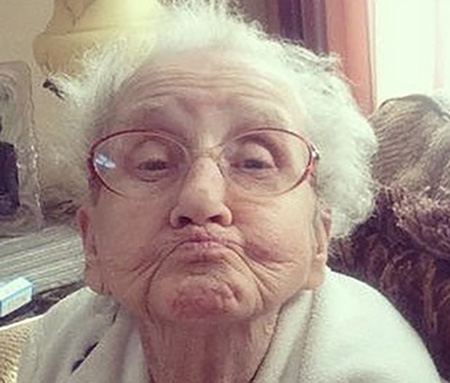
“My father was the first registered pharmacist in the state of Mississippi.”
Mrs. Carroll is one of the more fortunate residents of the nursing home, as she walks without the use of wheelchair, walker or cane. She was probably drawn into the room by the activity, as my mother and I are visiting my grandmother. My mother comes twice every day — lunch and dinner — to feed my grandmother, as she can no longer feed herself.
“My father was the first registered pharmacist in the state of Mississippi,” Mrs. Carroll says again. A small woman, she is lost in the heavy cardigan covering her yellow-print housedress. She has thick white hair that frames a high forehead and large ears. Her translucent skin is stretched across her cheekbones, and her glasses are askew on her nose. Behind them, however, her eyes are clear and alert.
“My father was the first registered pharmacist in the state of Mississippi, and I went to school at Sarah Newcomb in New Orleans. It’s a so-ci-e-ty school,” Mrs. Carroll holds up her pinky finger like she is drinking a cup of tea.
“You daughter told me you were a debutante,” my mother said. She is much better with these ancient ones than I am. My grandmother is unresponsive and says nothing.
“Oh, yes,” said Mrs. Carroll. Then, with a trace of bitterness, she adds, “What good does it do me now? It doesn’t amount to a hill of beans, not a hill of beans.”
I listen intently, searching her face for a some trace of the beauty she must have been. There is none. But what she does have is a warmth that emanates from within.
My mother walks out the door and down the hall in search of a nurse. I can’t think of anything to say. Like a true southern lady, however, Mrs. Carroll politely continues the conversation.
“Are you married?”
“No, I’m divorced.”
“Oh. Well, I guess that’s better than going through life unhappy. Do you have any children?”
“No, just a dog.”
“Well, it’s just as well there are no little ones to suffer.”
To my relief, my mother returns and joins the conversation. “Your daughter told me that you are very well-educated,” she said.
“Yes, my father was the first registered pharmacist in the state of Mississippi.”
My mother ignores her senility. “You must be very proud. Did you work?”
“Yes, I was the head nurse at St. Joseph’s Hospital. I took care of the premature babies.”
“So you have a degree in nursing.”
“Oh, no.” Mrs. Carroll pauses, lost in thought. “But I loved those little babies. All the education in the world won’t help if you don’t love those little babies.”
Mrs. Carroll had an odd habit of pushing out her lip with her tongue. I sit there silently, smiling and nodding.
“I was so stupid in school,” she said. “I thought I knew everything, but I didn’t know anything.” After reflecting for a moment, she adds, “These young people, they think they know everything, but they don’t know anything.”
My mother tactfully steers her away from this subject. “Did you travel very much?”
“Yes, we traveled a lot. My husband loved to travel.” She pauses, then asks if we are ready for Christmas.
“Not really,” I answer nervously. “But we have …” I hesitate, counting out the days on my fingers. “… four days left. We went shopping today and …” I let the sentence die. Why would she care, trapped in this nursing home day after day, month after month, year after year.
Mrs. Carroll again helps out with the limping conversation. “Well, I guess we should be thankful that we have a place to lay our heads. We have this lovely nursing home to be thankful for. We sit here and watch the people and cars pass by. Some of them go like this.” She illustrates her words with a gesture. Hand flat, fingers outstretched, she touches her thumb to her nose and wiggles her fingers. I am shocked. She sees my astonishment.
“Yes, it’s true,” she says. “They think we’re crazy, but we’re not.” She pauses. “And they laugh at us. The worst part is when your mind starts playing tricks on you. You think you can do things that you can’t do anymore.”
These aged ones live in a world that is part reality, part fantasy, somewhere between the past and present. Suddenly, the fire alarm just outside the door begins to shriek. My mother and I jump up, not certain what to do. While my mother hurries down the hall to investigate, I comfort my grandmother and Mrs. Carroll.
“Don’t worry, it’s probably a false alarm,” I say. Actually I am trying to reassure myself. I can’t imagine what it would be like if there were a fire in this nursing home.
Mrs. Carroll sidles up to me. “It’s no accident,” she whispers.
“Of course it is.” And I am certain that it is.
“No, they do it just to upset us. They think it’s funny.”
I am dismayed, realizing once again that Mrs. Carroll’s clarity comes and goes, much like that of my grandmother. I retreat to the other side of the bed, wishing suddenly that she would leave. She senses she has overstayed her welcome.
“Well, Merry Christmas to you,” she says, turning slowly toward the door.
“Merry Christmas to you,” I respond.
“You have a very Merry Christmas and a Happy New Year,” she says again.
“Same to you,” I wonder what could possibly be happy about her new year. “It was nice meeting you.”
Encouraged, Mrs. Carroll stops and turns back toward me. Should she stay longer? No. She moves unsteadily toward the door. “I’ll probably fall down,” she murmurs to herself.
“I would fall down,” my grandmother says suddenly. Surprised, I look over at her. She was listening after all.
